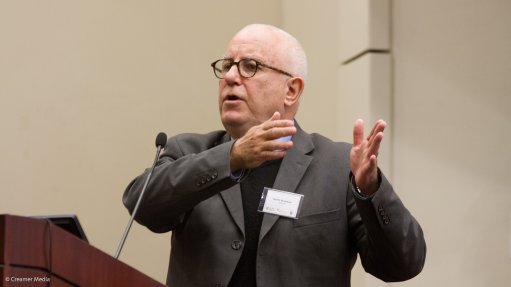
Department of Trade and Industry deputy director general for industrial policy and development Garth Strachan
Photo by: Duane Daws
It is important for sub-Saharan Africa, as a global growth frontier, to move away from its current economic growth path that relies almost exclusively on resource extraction and exports, towards a more sustainable development path that promotes industrialisation and value addition, Department of Trade and Industry (DTI) deputy director general for industrial and policy development Garth Strachan has said.
Speaking at the official opening of the inaugural bauma Africa International Trade Fair for Construction Machinery, Building Material Machines, Mining Machines and Construction Vehicles, held in Midrand, Strachan said the manufacturing sector had to lead this shift.
“However, there is a complicated set of factors that has to be put in place to establish manufacturing capacity in sub-Saharan Africa, including encouraging and facilitating inward investment into this important sector.
“Public and private sector procurement by mining companies, in particular, can and must play an important role, through supplier development, in supporting the development of upstream and downstream economic activity and linkages to move the region away from export and resource dependence,” he stated.
This development of economic activity and linkages through the manufacturing sector, in the opinion of government, also had to include support from small and medium-sized enterprises and black economic-empowerment (BEE) initiatives in communities adjacent to the mines and further afield, to reach the desired transformation, Strachan said, adding that in South Africa alone, mining industry procurement amounted to about R200-billion a year.
Meanwhile, he also cited government’s planned investment in infrastructure in Africa, as an opportunity to boost the local manufacturing sector.
“The South African government has set aside R827-billion for infrastructure over the next three years. The pipeline of infrastructure projects falling under Economic Development Minister Ebrahim Patel and the Presidential Infrastructure Coordinating Commission up to 2030 has, thus far, been proposed as being valued at R4.3-trillion for national and cross-border infrastructure development in 18 strategic projects, on which the DTI is working with other departments in a concentrated manner,” he said.
Strachan pointed out that infrastructure development was important, as it was not only an enabler of competitiveness and trade, but also a stimulant of economic growth.
He said infrastructure development was, therefore, critical to resource extraction and the establishment of a new, inclusive and developmental growth path.
“The African Development Bank estimates that sub-Saharan African infrastructure spending in the last financial year amounted to $45-billion, and that it will continue to increase steadily. It is obvious, therefore, that, apart from procurement by mining companies, there are enormous opportunities in the pipeline relating to infrastructure expansion,” Strachan said.
He said that the South African government had to work closely with the private sector to maximise this opportunity to encourage inward investment into manufacturing in the sector and deploy a set of policy measures to support existing companies as they upgraded competitiveness, innovation, research and development, new products and systems development, technology acquisition, and transformation and BEE, besides others.